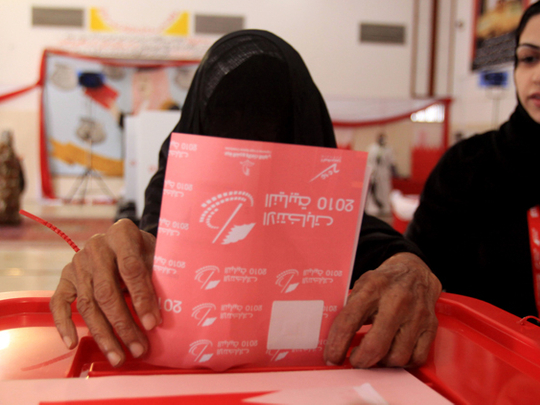
Manama: Public backing for independent candidates in Bahrain continued to rise in the second round of the parliamentary elections, as ballots propelled six new winners into the lower chamber's new, second largest bloc.
The results on Saturday boosted the total figure of independent winners to 17, only one man short of the standing achieved by Al Wefaq, the largest political and religious society, after it won the 18 constituencies in which it fielded candidates, all males.
Some of the independent winners have already started talking about forming a bloc with strong economic policies.
However, as the new bloc has been contemplating its moves within the lower chamber, the three political societies still in contention have been re-evaluating their performance and their influence.
They failed to impress the more than 70,000 voters who cast their ballots on Saturday to choose the remaining nine lawmakers in the 40-seat lower chamber.
The Islamic Menbar, the biggest loser in the first round on October 23 with zero wins on its record, secured only two constituencies, and the exit of its chairman former MP Abdul Latif Al Shaikh will go down as one of the greatest shocks in the 2010 elections.
The society, an offshoot of the Muslim Brotherhood, had six lawmakers between 2002 and 2006 and seven betwee 2006 and 2010. It hoped to reinforce its presence and clout between 2010 and 2014 by fielding eight candidates amid pledges that they would all win.
Al Asala, which represents the Salafis in Bahrain, also stumbled, winning only three seats. It had eight in the previous term and the powerful post of first deputy speaker.
Although Ganem Bu Ainian, its chairman, won in the second round, he is unlikely to retain his leadership in the lower chamber.
The National Democratic Action Society "Waad", Bahrain's largest liberal formation, has again failed to win a seat despite strong showing by its chairman Ebrahim Sharif who was particularly graceful in his defeat, and Muneera Fakhroo, the only woman to be supported by a political society.
Ebrahim lost to Ali Ahmad from the Islamic Menbar and Muneera could not match the score achieved by independent candidate Eisa Al Qadi.
Muneera's defeat meant that Latifa Al Gaood will be the only woman in the lower chamber, a repeat of the 2006 – 2010 term. On both occasions, Latifa won after running unopposed in her constituency.
Both Waad candidates were in their second attempt to enter the lower chamber after their failed bid in 2006 despite making it to the second round.
Their loss seemed to confirm the statement made by Adel Al Mouawda, the leader from Al Asala, to Gulf News last week that liberals had no chance to be elected in Bahrain where religion was a particularly strong factor.
Khalifa Al Dhahrani, the veteran independent lawmaker who was member of Bahrain's first parliament in 1973 and speaker of the lower house in 2002 and 2006, is likely to retain his post thanks to open support from the five Islamist and the other 16 independent MPs.
The names of the 40 members of the Shura Council, the upper house of the bicameral parliament, are likely to be announced this week.












